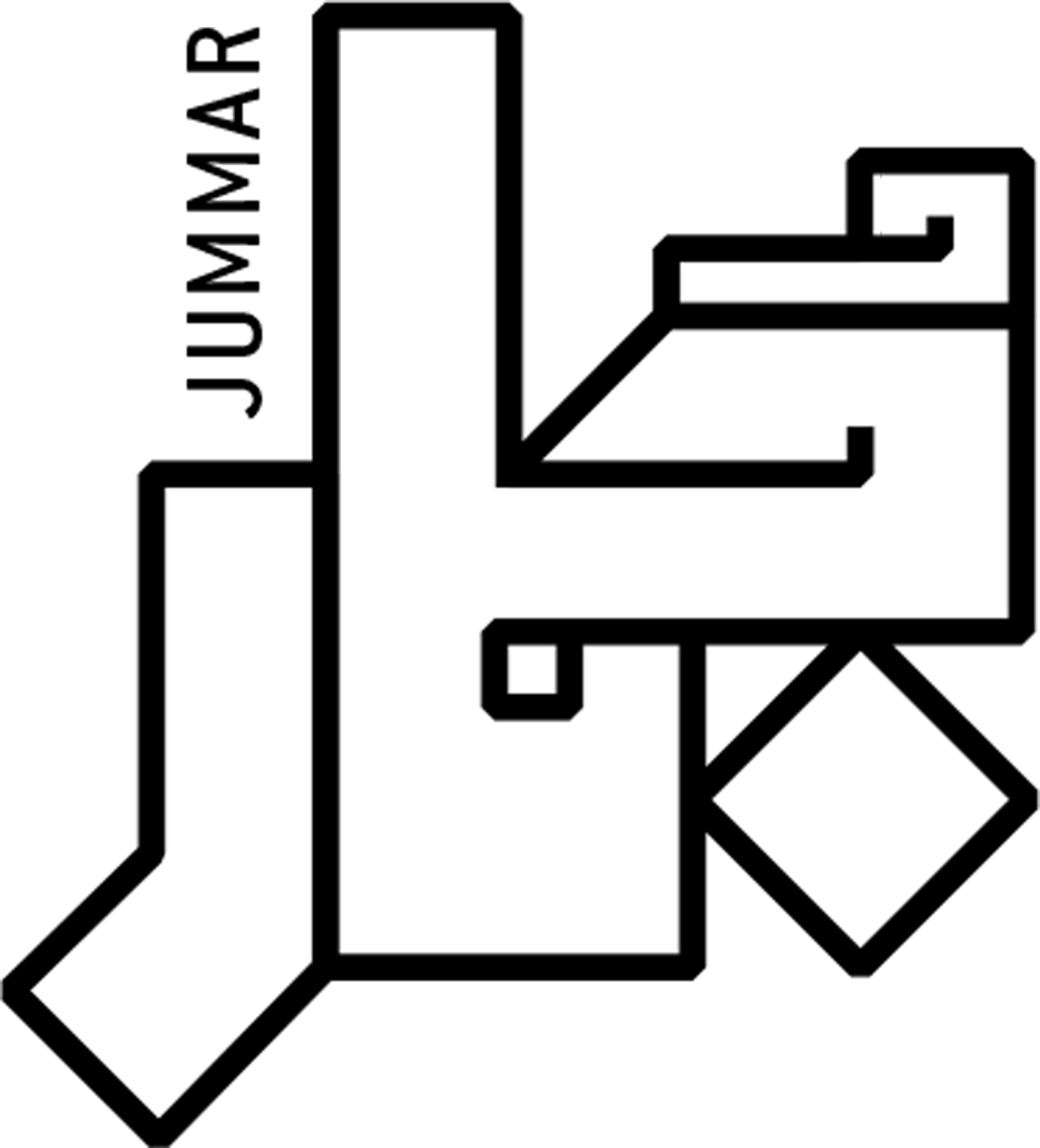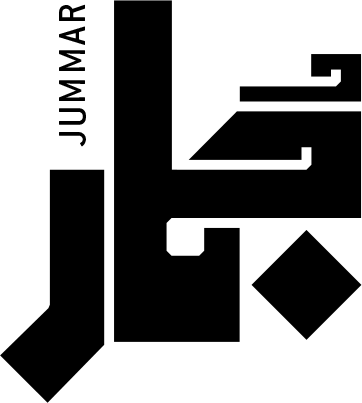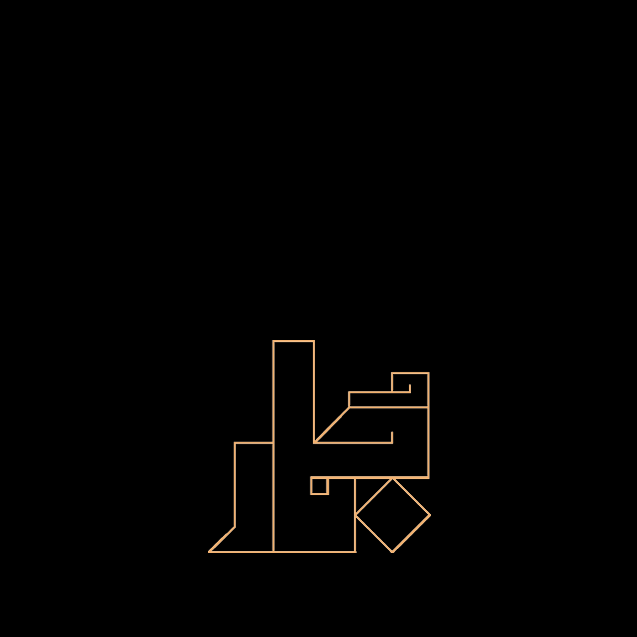“Al-Taʿshaat”– How the Sexual Exploitation of Iraqi Minors Became an Acceptable Act
08 Feb 2023
The terms “Al-taʿshaat” [Iraqi term for teens], “Al-heloueen” [catamites], and “Al-froukh” [chicks], which we categorically oppose the use of, characterise gender stereotypes that were created in relation to “masculinity” by heteronormative society, and thus define certain social roles accordingly. This is similar to the social perception of women’s gender roles. The sexual exploitation of Iraqi minors has been transformed into an acceptable act.
Although there is no linguistic root for the word “taʿshaat” [Iraqi term for teens], which exists in Iraqi everyday language, it is used figuratively to refer to minor male youths between ten and eighteen years of age. This term is a derivative of a group of certain numbers in Iraqi Arabic, which are pronounced differently depending on dialect: as “tlataʿesh” meaning thirteen, “arbataʿesh” meaning fourteen, and so on. The word “Al-taʿshaat” then, meaning ‘teens’, has become more prevalent than other terms, such as “Al-farakh” [chick] and “Al-helou” [catamite], in the context of the sexual attraction of adult males towards minor males. Each term denotes something about the minor, but “Al-taʿshaat” was mainly created to obfuscate the age of the minor who is sexually exploited and so deflecting suspicion from his exploiters.
Each of the terms, “Al-taʿshaat”, “Al-heloueen” [catamites], and “Al-froukh” [chicks], which we categorically oppose the use of, characterise the gender stereotypes that were created in relation to “masculinity” by heterosexual society, and thus define certain social roles accordingly. This is similar to the social perception of women’s gender roles, according to which they are expected to perform certain duties, primarily sex and reproduction.
The youth who is characterised as “Al-helou”, which means “beautiful” in the literal sense, has a specific role that differs from others in the surrounding social environment. He is recognised as someone who accompanies adult males in cafe sessions or public outings. Many believe that “Al-helou” is not exploited sexually, as he merely goes out with his escort in exchange for money or hookah. Sometimes, it does not go beyond being openly intimate with his companion. However, it is not possible to prove if they have not been subjected to sexual abuse or individual or gang rape, as most of them do not talk about these incidents due to social stigma and fear of shame. These youths have to deal with verbal and physical abuse as an inevitable fate because “Al-helou” is subordinate to someone. This subordination means that their personal space is not respected and makes them unable to reject “caresses” or harassment by the so-called “Al-qurum”, an Iraqi term for “the top”, which is the dominant person in the relationship. This is one of the practices of domination in such relationships, where minors cannot say “no” to those who accompany them or pay their expenses.
As for the word “Al-farakh” [chick], it commonly refers to villagers who come to the city or their children and grandchildren who are still living in rural areas. This name characterises them as young birds. But this term has come to carry an obvious sexual connotation, as it refers to males who are subjugated to having sex. This word has strong associations of shame and humiliation in relation to the sexual act, even for the adult man who engages sexually with those whom he portrays as “Al-farakh”.
We consider these practices an extension of patriarchal structures of domination, not only in creating perceptions about minors but also in normalising forced sex. These adults do not consider their partners’ consent in sex; they view them instead as “chicks” to be used as sex objects, with no regard for their desires, personalities, or health, putting them at risk from sexually transmitted diseases (STDs). Skin infections are also among these diseases, as well as HIV/AIDS, which creates an even greater stigma for its carriers in a society that is uneducated and ill-informed in dealing with such cases, and in a country that cannot provide adequate healthcare. Besides, sexual relations with minors are considered unsafe for the children’s mental health and are a violation of their childhood. However, less progressive people in this society continue to refuse to learn about sexual health and safe sex. This allows these exploitative and harmful practices to prevail, practices which are in fact sexual abuse.
This context results in predatory men using their male privilege and paternalistic authority in exploitative homosexual relations, without acknowledging their own homosexuality or the existence of the relationship. We must recall that a man’s attainment of male privilege depends on how much his masculinity matches that which society considers to be ideal.
I spoke with M. Y., a teenage high school student working in a coffee shop, to understand his mistreatment of a friend whom he describes as a “chick”. He says, “I am not afraid to talk about my sexual activities because I do not allow anyone to touch my bottom. I am the one who touches his. So, I have the right to treat him as I please because he handed me his “ʿaziza” [a slang word for bottom in the Iraqi language].” M. Y. is not the only one who thinks this way. In same-sex relations, the focus on honour shifts from the woman’s vagina to the man’s anus. The difference in organs does not change stereotypes or social roles; thus, men bring to bear the same oppression they impose on women in their relationships onto these young men. They consider their sexual partner submissive because they do not see him as a man, but as a substandard male who is not manly enough, so he consents to anal sex.
There are many social reasons for the exacerbation of sexual violence against men, especially minors, including the lack of sexual health education in heterosexual as well as homosexual relationships. In addition, the paedophilia discussed here threatens society if left unchecked. For example, M. Y. has sexual relations with women, but according to him, “they are not as available as same-sex relations”.
M. M., who is employed and in his mid-forties, says that he escapes his wife’s “lascivious” sexual demands, which he cannot satisfy, through homosexual relations. He says, “sex with ‘Al-heloueen” is much better than with my wife, whose demands I do not like nor her doubts about my manliness. I have had three children to prove my virility, but I cannot keep up with her sexual appetite for long. “Al-heloueen” have no demands. I like them because they always try to escape from sex; we finish quickly and then take off without asking each other to slow down, or speed up or for a second round”. M. M. despises his sexual encounters with men, similarly to M. Y., and refuses to consider his relations as homosexual. This became clear when he aggressively used sexual terms towards us that indicated shame and humiliation, after we opposed his opinion regarding homophobia. According to M. M., those who support a person who “hands his bottom” are also submissive and servile, regardless of their sexuality.
M. M. and M. Y. represent a category of men who mostly come from poorer urban neighbourhoods and traditional families, who are influenced by prevailing social ideas and assimilate them without criticism. They apply dominant stereotypes in their daily relations with women and men alike. Thus, it no surprise that Iraq has one of the highest rates of sexual violence against men among Arab countries (Although the report did not identify perpetrators, testimonies suggest that it is primarily men who commit these offences).
Society’s silence in relation to sexual exploitation and rape among men protects and normalises the phenomena to the extent that offenders do not hesitate to show pictures of their encounters, as they do not consider their actions to be exploitation. These individuals do not believe they are socially rejected, because these relationships are not censured by patriarchal society. This allows a continuation of the social acceptance of this type of relationship, and is an inevitable consequence of a dominant heterosexual view of sex and a desire to prove virility. The complicity of societal tolerance with offenders, in concealing and normalising their violent practices shows that society’s rejection of same-sex relationships is not related to religion, as claimed, especially in poor urban areas and among conservative families. It is, instead, a part and parcel of patriarchal dominant narratives resulting from an accumulation of stereotypes in relation to masculinity, femininity, sex, and sexual activities.
Either way, sexual exploitation and rape among males cannot be considered an expression of the individual’s sexuality, but a continuity of heteronormative aggression and exploitation of those of us who belong to the LGBTQ community in Iraq. We are the ones who face marginalisation, exclusion, persecution, rape and even murder. We do not accept the social views, stereotypes, and labels that we have become the object of as a queer community, and we certainly do not support nor defend these types of relationships.
Read More

“His gaze was intrusive; it pierced my soul”: On the Struggles of Divorced Women in Navigating Courts and Governmental Institutions
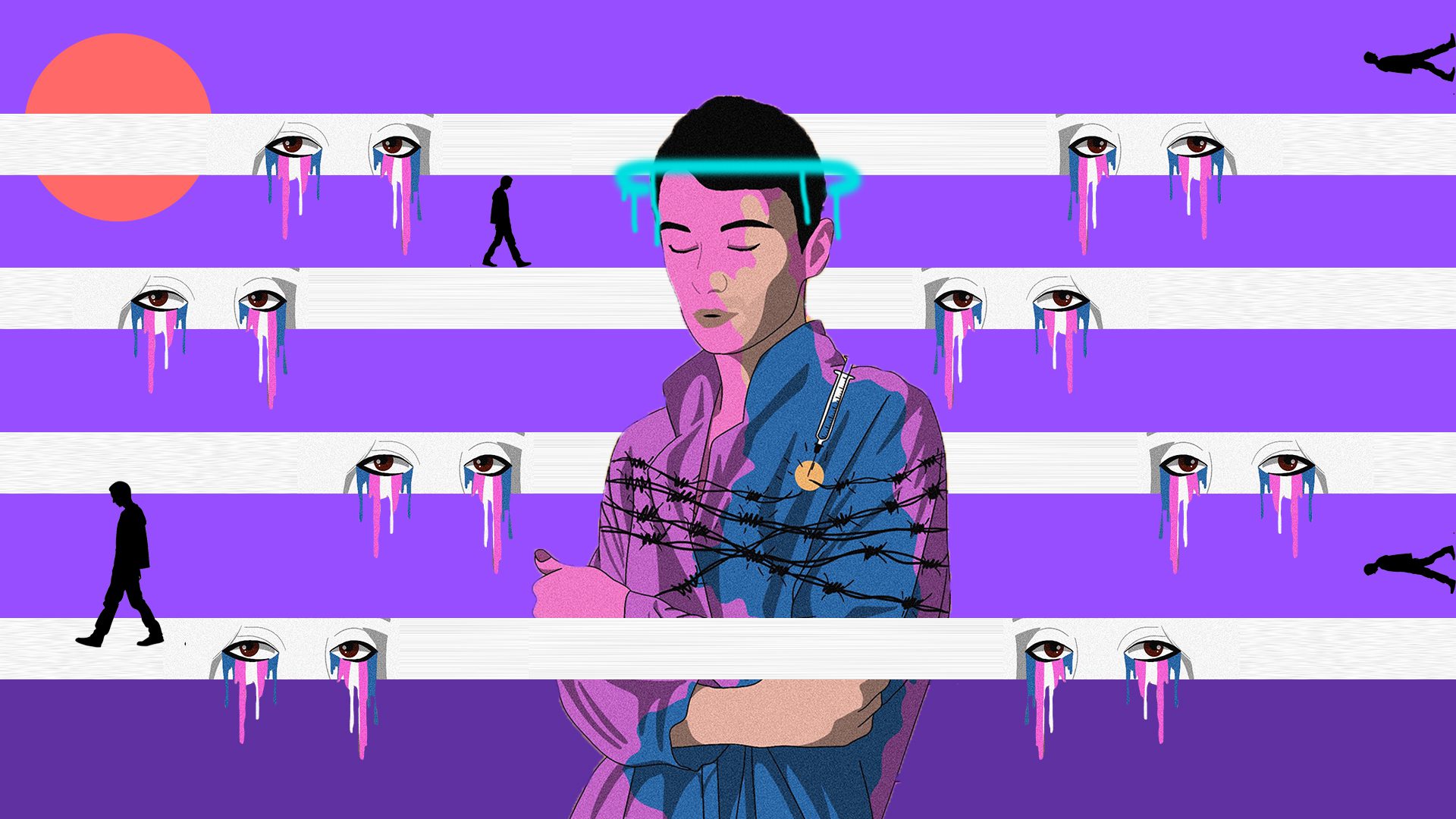
“She Brought a Fatwa from Khamenei and Al-Azhar, But It Went Nowhere”: The Struggles of Trans People in the Iraqi Health Sector
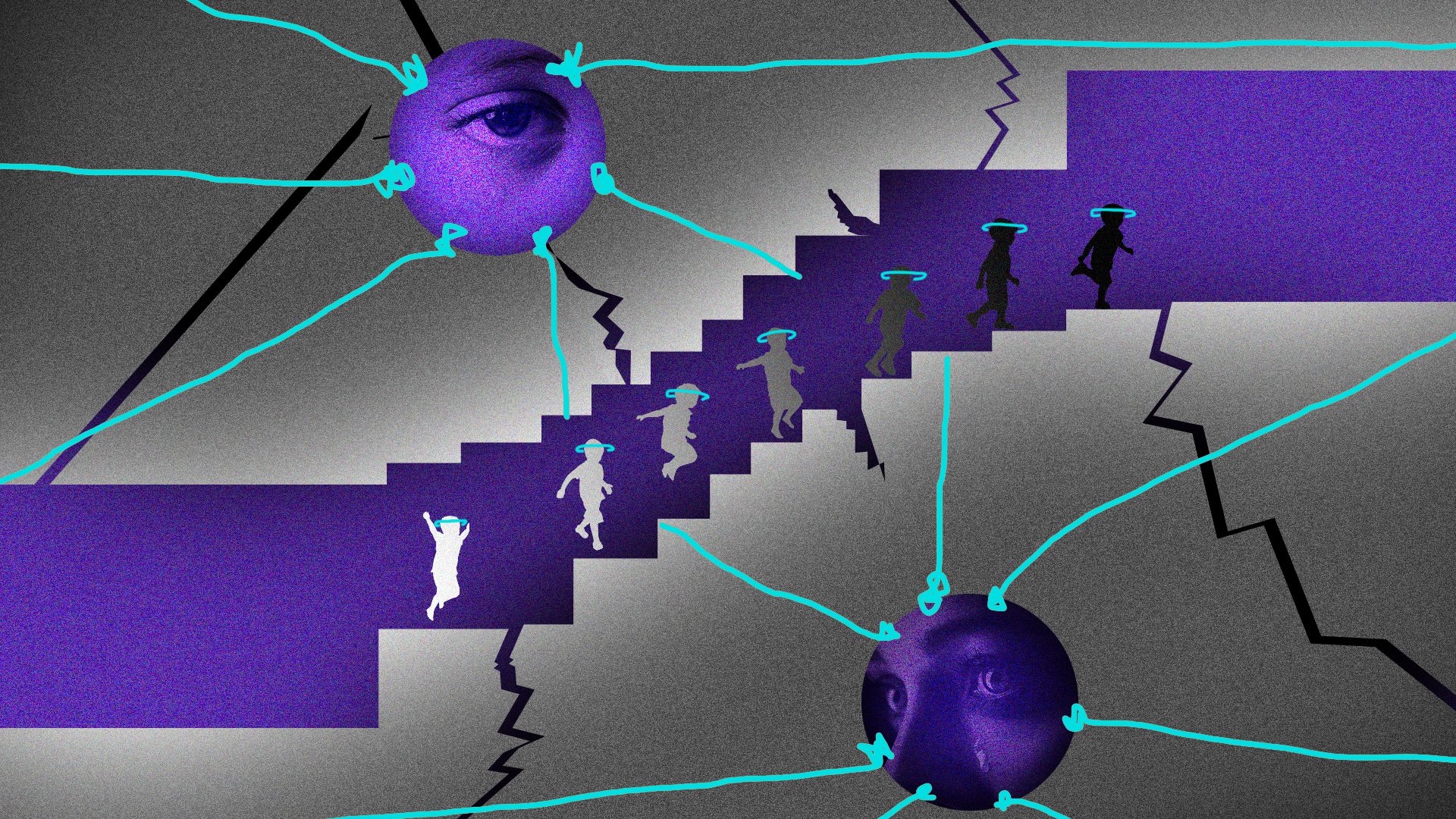
“Everyone has a Right to the Kids Except their Mother”: On Women Fighting for the Custody of Their Children
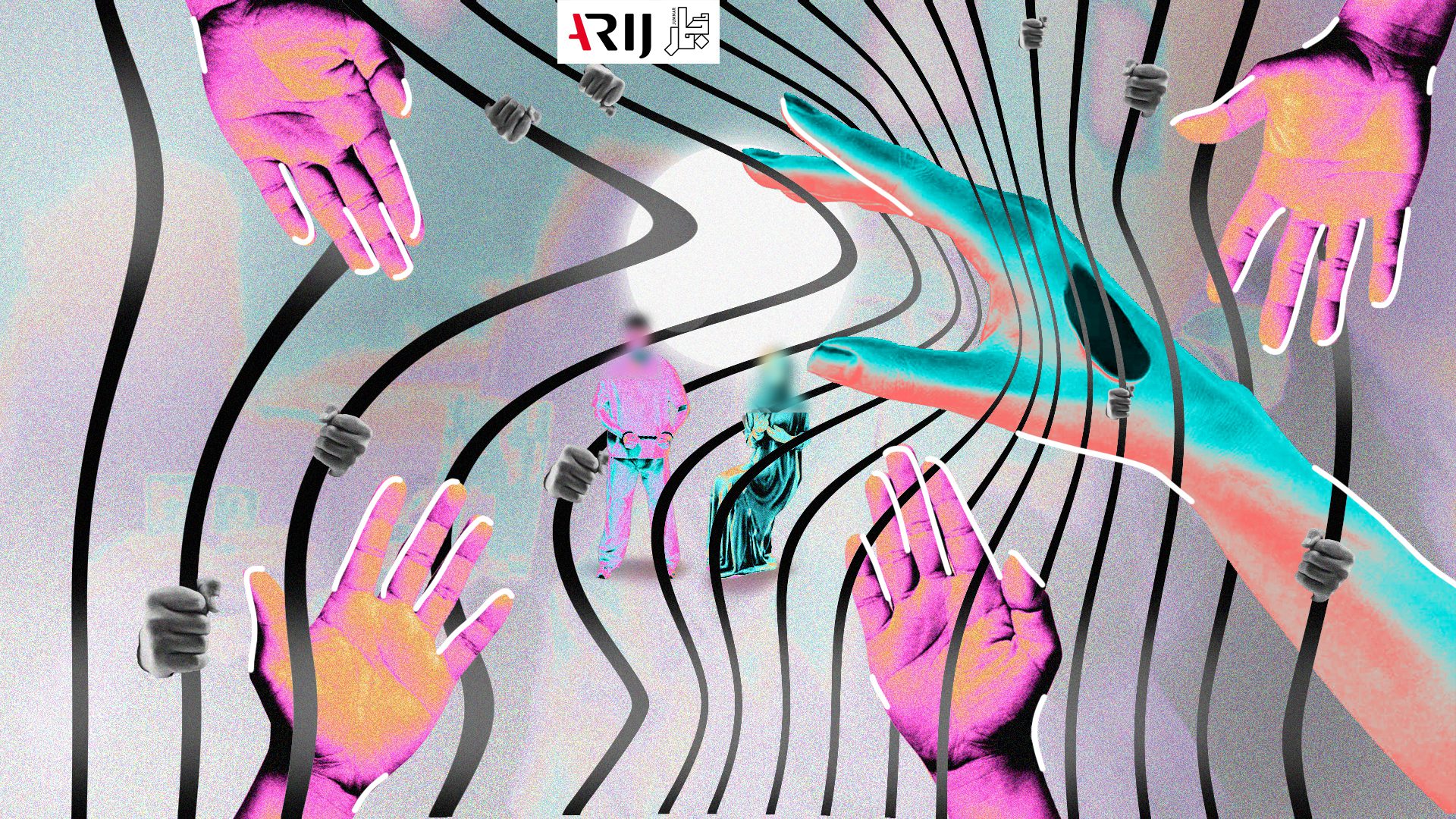
Iraqi Prisoners Blackmailed to Pay To Obtain Release Papers After Completing Their Sentence
Although there is no linguistic root for the word “taʿshaat” [Iraqi term for teens], which exists in Iraqi everyday language, it is used figuratively to refer to minor male youths between ten and eighteen years of age. This term is a derivative of a group of certain numbers in Iraqi Arabic, which are pronounced differently depending on dialect: as “tlataʿesh” meaning thirteen, “arbataʿesh” meaning fourteen, and so on. The word “Al-taʿshaat” then, meaning ‘teens’, has become more prevalent than other terms, such as “Al-farakh” [chick] and “Al-helou” [catamite], in the context of the sexual attraction of adult males towards minor males. Each term denotes something about the minor, but “Al-taʿshaat” was mainly created to obfuscate the age of the minor who is sexually exploited and so deflecting suspicion from his exploiters.
Each of the terms, “Al-taʿshaat”, “Al-heloueen” [catamites], and “Al-froukh” [chicks], which we categorically oppose the use of, characterise the gender stereotypes that were created in relation to “masculinity” by heterosexual society, and thus define certain social roles accordingly. This is similar to the social perception of women’s gender roles, according to which they are expected to perform certain duties, primarily sex and reproduction.
The youth who is characterised as “Al-helou”, which means “beautiful” in the literal sense, has a specific role that differs from others in the surrounding social environment. He is recognised as someone who accompanies adult males in cafe sessions or public outings. Many believe that “Al-helou” is not exploited sexually, as he merely goes out with his escort in exchange for money or hookah. Sometimes, it does not go beyond being openly intimate with his companion. However, it is not possible to prove if they have not been subjected to sexual abuse or individual or gang rape, as most of them do not talk about these incidents due to social stigma and fear of shame. These youths have to deal with verbal and physical abuse as an inevitable fate because “Al-helou” is subordinate to someone. This subordination means that their personal space is not respected and makes them unable to reject “caresses” or harassment by the so-called “Al-qurum”, an Iraqi term for “the top”, which is the dominant person in the relationship. This is one of the practices of domination in such relationships, where minors cannot say “no” to those who accompany them or pay their expenses.
As for the word “Al-farakh” [chick], it commonly refers to villagers who come to the city or their children and grandchildren who are still living in rural areas. This name characterises them as young birds. But this term has come to carry an obvious sexual connotation, as it refers to males who are subjugated to having sex. This word has strong associations of shame and humiliation in relation to the sexual act, even for the adult man who engages sexually with those whom he portrays as “Al-farakh”.
We consider these practices an extension of patriarchal structures of domination, not only in creating perceptions about minors but also in normalising forced sex. These adults do not consider their partners’ consent in sex; they view them instead as “chicks” to be used as sex objects, with no regard for their desires, personalities, or health, putting them at risk from sexually transmitted diseases (STDs). Skin infections are also among these diseases, as well as HIV/AIDS, which creates an even greater stigma for its carriers in a society that is uneducated and ill-informed in dealing with such cases, and in a country that cannot provide adequate healthcare. Besides, sexual relations with minors are considered unsafe for the children’s mental health and are a violation of their childhood. However, less progressive people in this society continue to refuse to learn about sexual health and safe sex. This allows these exploitative and harmful practices to prevail, practices which are in fact sexual abuse.
This context results in predatory men using their male privilege and paternalistic authority in exploitative homosexual relations, without acknowledging their own homosexuality or the existence of the relationship. We must recall that a man’s attainment of male privilege depends on how much his masculinity matches that which society considers to be ideal.
I spoke with M. Y., a teenage high school student working in a coffee shop, to understand his mistreatment of a friend whom he describes as a “chick”. He says, “I am not afraid to talk about my sexual activities because I do not allow anyone to touch my bottom. I am the one who touches his. So, I have the right to treat him as I please because he handed me his “ʿaziza” [a slang word for bottom in the Iraqi language].” M. Y. is not the only one who thinks this way. In same-sex relations, the focus on honour shifts from the woman’s vagina to the man’s anus. The difference in organs does not change stereotypes or social roles; thus, men bring to bear the same oppression they impose on women in their relationships onto these young men. They consider their sexual partner submissive because they do not see him as a man, but as a substandard male who is not manly enough, so he consents to anal sex.
There are many social reasons for the exacerbation of sexual violence against men, especially minors, including the lack of sexual health education in heterosexual as well as homosexual relationships. In addition, the paedophilia discussed here threatens society if left unchecked. For example, M. Y. has sexual relations with women, but according to him, “they are not as available as same-sex relations”.
M. M., who is employed and in his mid-forties, says that he escapes his wife’s “lascivious” sexual demands, which he cannot satisfy, through homosexual relations. He says, “sex with ‘Al-heloueen” is much better than with my wife, whose demands I do not like nor her doubts about my manliness. I have had three children to prove my virility, but I cannot keep up with her sexual appetite for long. “Al-heloueen” have no demands. I like them because they always try to escape from sex; we finish quickly and then take off without asking each other to slow down, or speed up or for a second round”. M. M. despises his sexual encounters with men, similarly to M. Y., and refuses to consider his relations as homosexual. This became clear when he aggressively used sexual terms towards us that indicated shame and humiliation, after we opposed his opinion regarding homophobia. According to M. M., those who support a person who “hands his bottom” are also submissive and servile, regardless of their sexuality.
M. M. and M. Y. represent a category of men who mostly come from poorer urban neighbourhoods and traditional families, who are influenced by prevailing social ideas and assimilate them without criticism. They apply dominant stereotypes in their daily relations with women and men alike. Thus, it no surprise that Iraq has one of the highest rates of sexual violence against men among Arab countries (Although the report did not identify perpetrators, testimonies suggest that it is primarily men who commit these offences).
Society’s silence in relation to sexual exploitation and rape among men protects and normalises the phenomena to the extent that offenders do not hesitate to show pictures of their encounters, as they do not consider their actions to be exploitation. These individuals do not believe they are socially rejected, because these relationships are not censured by patriarchal society. This allows a continuation of the social acceptance of this type of relationship, and is an inevitable consequence of a dominant heterosexual view of sex and a desire to prove virility. The complicity of societal tolerance with offenders, in concealing and normalising their violent practices shows that society’s rejection of same-sex relationships is not related to religion, as claimed, especially in poor urban areas and among conservative families. It is, instead, a part and parcel of patriarchal dominant narratives resulting from an accumulation of stereotypes in relation to masculinity, femininity, sex, and sexual activities.
Either way, sexual exploitation and rape among males cannot be considered an expression of the individual’s sexuality, but a continuity of heteronormative aggression and exploitation of those of us who belong to the LGBTQ community in Iraq. We are the ones who face marginalisation, exclusion, persecution, rape and even murder. We do not accept the social views, stereotypes, and labels that we have become the object of as a queer community, and we certainly do not support nor defend these types of relationships.
